Hong Kong News

Who runs Hong Kong: party faithful shipped in to carry out Beijing's will
A senior communist party operative whose only previous experience in Hong Kong is a business trip two years ago; a former Guangdong mayor who oversaw the mass arrests of villagers protesting against land seizures; a former provincial party secretary best known for tearing down hundreds of churches and crosses in eastern China.
These are China’s top officials charged with Hong Kong affairs, hardliners and allies of the Chinese president, Xi Jinping, who are remaking the semi-autonomous territory into a city that is directly under Beijing’s control in all but name.
They remain behind the scenes, rarely making public appearances. Little is known about them or how they work. Still, their influence is felt, now more than ever, under the auspices of a national security law that has given mainland agents unprecedented powers in Hong Kong.
In the three months since China shocked Hong Kong residents and the international community by imposing the sweeping and punitive security legislation on 30 June, the city that was once a haven for Chinese dissidents and a rare enclave of freedom has been transformed with remarkable speed.
Authorities have delayed legislative elections by at least a year, citing concerns about the coronavirus pandemic. Using various political slogans is now tantamount to secession – a crime under the new law. Schools are changing their curriculum to better promote patriotism. At least 28 people have been arrested, many of them prominent pro-democracy activists.
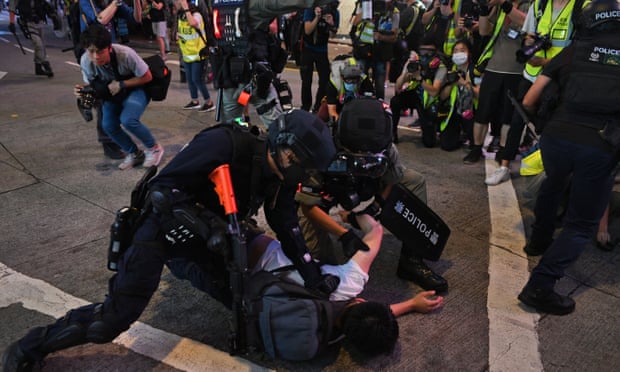
Many others have been detained under a ban on demonstrations. Academics, writers and once outspoken commentators have gone silent while the police have placed new restrictions on the media. Critics of the law, which was a response by Beijing to months of anti-government protests last year, say it has led to the most serious period of crisis and uncertainty since the former British colony was transferred to Chinese control in 1997.
“This is regime change. It has already happened,” said John Burns, a professor of politics and public administration at the University of Hong Kong. “It took 17 years for the party to implement.”
Just over a week after the law came into effect, mainland security officers took over a 33-storey hotel near Hong Kong’s Victoria Park, which was the site of many of last year’s marches calling for democratic reforms. A few miles away is China’s top body in the city, the central government’s liaison office, a tall glass and concrete building surrounded by barricades and police patrols. The site of many protests last year, the building was vandalised several times before the barriers were set up. Many see it as the true seat of power in Hong Kong.
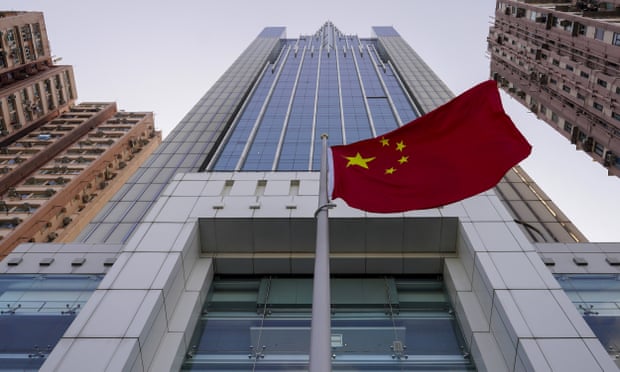
“I think that’s the new normal. They [the liaison office] operate quietly in the background, but we can feel their impact and their influence in all these arrests,” said Jean-Pierre Cabestan, a professor of Chinese government and politics at Hong Kong Baptist University.
After the 1997 handover, the Hong Kong government – with its own legislature, judiciary and executive branch – operated with a certain degree of autonomy under the one country, two systems framework. While the head of the government, the chief executive, ultimately answered to Beijing, they still made their own policies and decisions.
“[They] did what they thought Beijing wanted to be done, which means they would not always be interfered with,” said Steve Tsang, director of the China Institute at Soas University of London.
But after witnessing months of protests last year turn into an entrenched movement of resistance, Beijing has begun to radically overhaul how it governs Hong Kong.
Following a major leadership meeting last October, the central committee of the Communist party of China released a communique pledging to strengthen the central government’s ability to “exercise comprehensive governance” over Hong Kong. More telling is that senior officials loyal to Xi have been brought out of semi-retirement to direct Hong Kong affairs.
Beijing’s new range of influence
Luo Huining, 65, who made his name tackling corruption in Shanxi province as party secretary, the top provincial party position, presides over the liaison office. His only known experience in Hong Kong is a business trip made in 2018. Described by some as an old-school party hack, he has also been named adviser to a new security commission headed by the territory’s chief executive, Carrie Lam – an appointment that observers say shows who is now calling the shots.
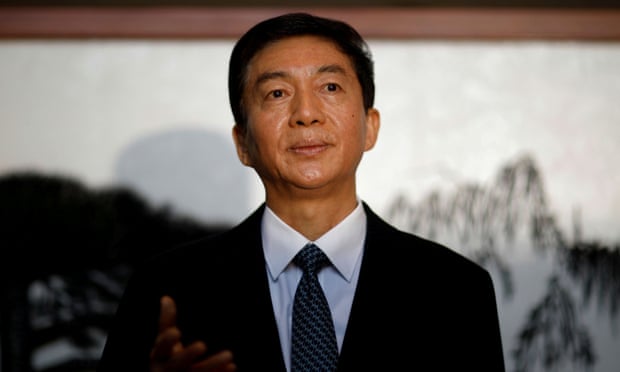
“Luo Huining is the person in charge, not Carrie Lam,” said Suzanne Pepper, a Hong Kong-based writer who focuses on Chinese politics. “The power structure has changed drastically with the introduction of the new law.”
Above Luo is Xia Baolong, 67, another former party secretary who oversaw the razing of churches in Zhejiang province in 2014 and 2015. Xia, a protege of Xi’s who previously declared himself a proud member of the top leader’s “iron army”, was also brought out of semi-retirement. Xia directs the state council’s Hong Kong and Macau Affairs Office (HKMAO) in Beijing and, as a vice-chairman of a top political advisory body, is the highest-ranking official to hold the post in a decade.
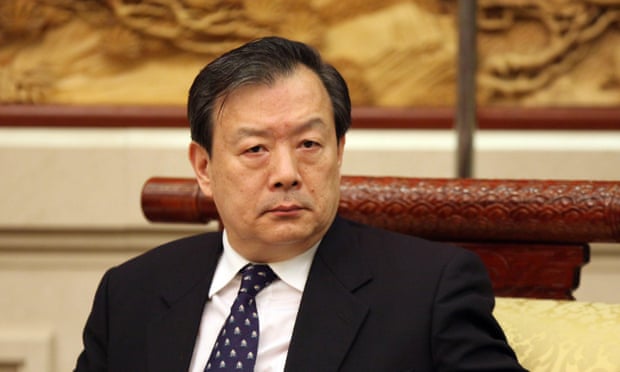
Over the years both the liaison office and the HKMAO have increased their influence over Hong Kong – a trend now accelerated by the new law, according to local politicians and experts.
“Carrie Lam will have to look over her shoulder for what Beijing will think. Over the first shoulder is the head of the liaison office, and over the other is the head of the Hong Kong Macau Affairs Office,” said James Tien, a former lawmaker.
Neither Xia nor Luo have experience in Hong Kong, a sharp departure from past appointments and a sign of a move to methods more similar to those on the mainland – an alarming trend given the vast powers of security agents in China and the frequency with which political dissidents and critics are jailed on charges of national security.
“That is a danger for Hong Kong. That is a real dark cloud. They may apply the same method as in mainland China in an environment that is very different and more open,” said Cabestan.
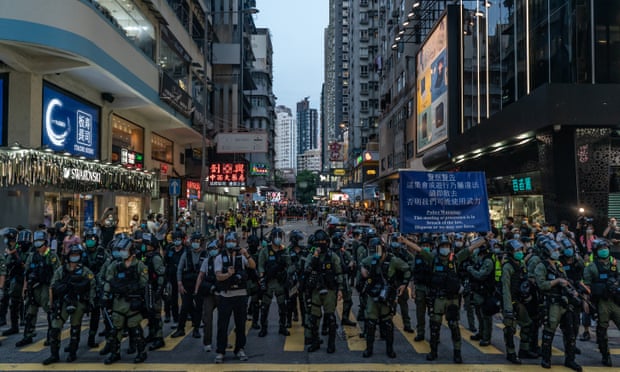
The clearest indication of that direction is the establishment of a national security office headed and run by mainland agents. The office, which has broad remit to gather intelligence, handle “complex” national security cases and regulate foreign media and organisations, is not bound by local laws and its work will remain secret.
Its director, Zheng Yanxiong, comes from Guangdong province, just across the border where he is best known for suppressing mass protests in the fishing village of Wukan in 2011 through a police siege that prevented food and supplies reaching residents.
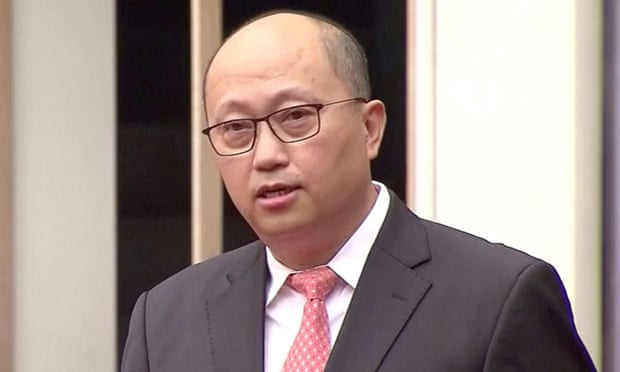
His approach is typical of mainland security officers, as are his views of foreign journalists. Zheng was recorded criticising international attention on Wukan, saying at the time: “If the foreign media could be trusted, then sows could climb trees.”
Other powerful security officials have been entrusted with overseeing Hong Kong such as Zhao Kezhi, China’s minister of public security, who is a deputy of China’s highest body for deciding Hong Kong policies, the Central Leading Group on Hong Kong and Macau Affairs. Zhao is also part of a newly formed committee on the mainland, the Secure China Development group, tasked with creating a “safe political environment” by targeting issues like subversion, separatism and religious extremism.
Observers say Beijing’s new range of influence is obvious in everything from the push for patriotic education to seemingly benevolent acts of charity such as the deployment of health workers from China to test everyone in the city for Covid-19 and how local officials have adjusted their tone to match Beijing’s.
“We see finger prints of Beijing all over the place,” said Ma Ngok, an associate professor at the Chinese University of Hong. “It is going to get worse. Beijing will continue to intervene.”
Advertisement
Experts of party politics say that the chain of command leading up to Beijing is murky but it is clear who has the final say in Hong Kong today.
“We know that Beijing is pushing certain things but who is giving instructions to whom - we don’t see them,” said Willy Lam, an adjunct professor at Chinese University of Hong Kong.“But it is believed that the major, the most important decision are made by Xi Jinping.”
Yet, Beijing’s efforts are not without difficulty. Mainland officials are operating among a population that has had decades of an independent judiciary, a free press and open, uncensored access to the internet. .
“You have the majority resisting Beijing. Hong Kong society cannot be easily subdued,” said Victoria Tin-bor Hui, an associate professor of political science at the University of Notre Dame who follows Hong Kong politics closely.
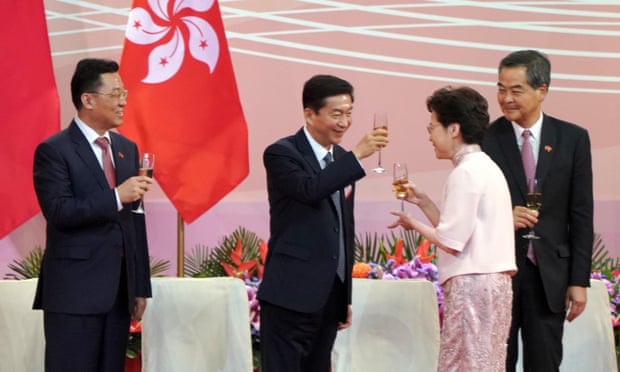
Less than 12 hours after the national security law went into effect, on 1 July Luo clinked champagne glasses with Lam, celebrating the anniversary of the Hong Kong’s handover. In a speech, Luo warned the new legislation would be a “high hanging sword” over the heads of those who dared to violate it.
Still, demonstrators filled the streets and by the end of the day, more than 300 people were arrested. In the last three months, resistance has taken more indirect forms, from residents buying up shares in the media company of activist Jimmy Lai after he was arrested to supporting pro-democracy businesses.
“We’re all uncertain but know deeply that we have to keep doing something, anything,” said one demonstrator, who asked not to be named.
“The risk of stepping out on to the streets is way too high for most people and even speaking out is dangerous,” she said. “It’s harder to feel like people are still in it with you but I still have hope because I know people will keep going.”











